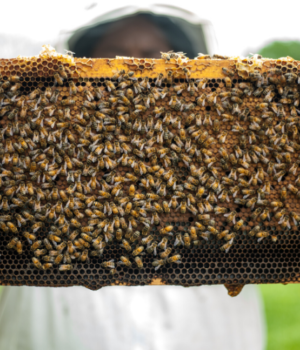ONTARIO — The governments of Canada and Ontario are supporting projects that will strengthen the health of managed honey bees and Ontario’s beekeeping sector.
Since September 2019, the federal and provincial governments have committed more than $221 thousand to support 135 projects. These projects will help beekeepers make improvements to better manage pests, diseases and other stressors and grow their bee-related business. Factoring in project funding coming from the businesses themselves, this represents a joint investment of more than $602 thousand in the sector.
The funding has been provided through a targeted application intake under the Canadian Agricultural Partnership (the Partnership). Eligible applications are being received and assessed on a continuous basis, while funding is available. This initiative is delivered by the Ontario Soil and Crop Improvement Association (OSCIA), and supports specific beekeeping activities in two project categories, Advancing Beekeeper Business Capacity; and Honey Bee Health Management. Some projects supported through this targeted intake include:
Equipment to help managed honey bees survive over the winter months
Projects to detect and manage pests such as varroa mites
Technology to enhance production
Equipment to prepare operations for managing Small Hive Beetle
Market and customer research to help increase sales.
“Many of our agricultural crops depend on the health and productivity of our pollinators, and this regional approach to strengthening Ontario’s honey bee populations plays a vital role in allowing our high-value crops to succeed,” said the Honourable Marie-Claude Bibeau, federal Minister of Agriculture and Agri-Food.
Since June 2018, both the federal and provincial governments have committed cost-share support to approximately 2.5 thousand projects through the Partnership to help eligible Ontario farmers, processors, businesses and sector organizations innovate and grow. OSCIA also delivers cost-share funding under the Partnership for farmers and other businesses (plant health). The next application intake for this group is from January 8 to January 29. Program details, including how to apply, program guides, and application forms, can be found on the OSCIA website.
The health of honey bees is complex and influenced by several factors, including diseases, pests, genetics, environmental stressors and extreme weather. In addition to producing honey, Ontario-managed honey bees pollinate a wide range of crops, including apples, apricots, asparagus, blueberries, squash and canola, both within Ontario and in other provinces. Managed honey bees pollinate 80 per cent of all agricultural crops requiring insect pollination. They account for $395 million in pollination services to Ontario farmers and contribute $30 million a year in honey sales.
“Honey bees play an essential role in Ontario’s agricultural sector and in maintaining healthy ecosystems,” said the Honourable Ernie Hardeman, Ontario Minister of Agriculture, Food and Rural Affairs. “That’s why it’s so important to support and sustain the health of our honey bees. This investment has helped over 135 beekeepers so far to equip themselves with better tools to prevent diseases, improve winter survival, adopt best management practices and grow their businesses.”
Examples of projects supported through the Partnership since June 2018 include: implementation of technology to enhance food safety in processing plants; improving adoption of cover crop management to help reduce phosphorous entering the Lake Erie watershed; installation of equipment to to improve biosecurity; technology solutions to improve labour productivity and marketing plans to help businesses to expand their markets. The Canadian Agricultural Partnership is a five year, $3 billion commitment by Canada’s federal, provincial and territorial governments that supports Canada’s agri-food and agri-products sectors.







![Kenopic/Smith Auction [Paid Ad]](https://whitewaternews.ca/wp-content/uploads/2018/10/advertising-100x75.jpeg)

